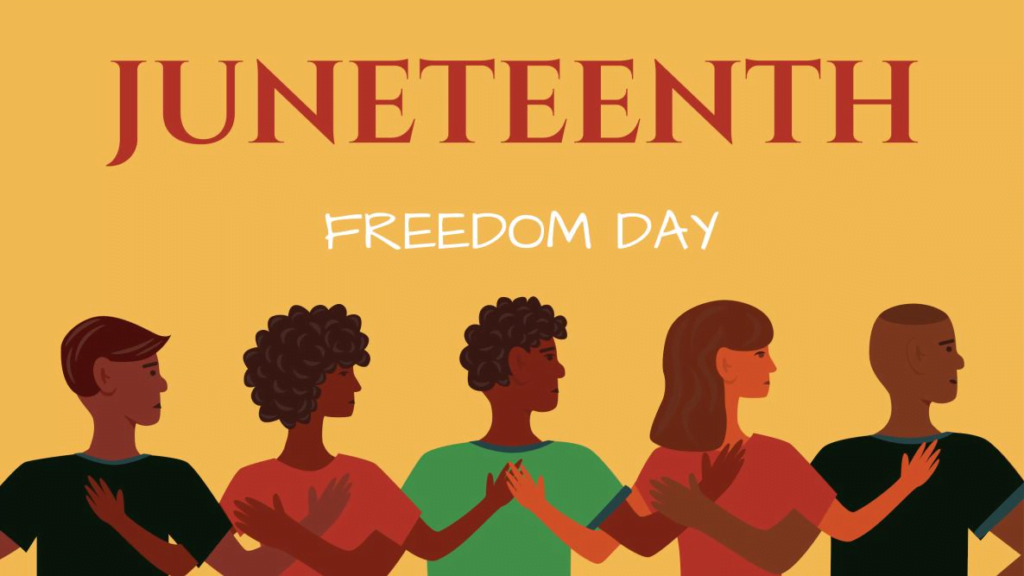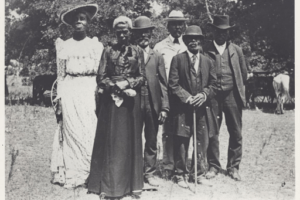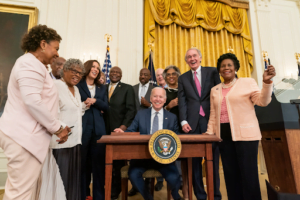
On Wednesday, June 19th, Americans celebrated Juneteenth, which marks the day when the final remaining enslaved people in the United States learned they were free. Also known as Freedom Day, Emancipation Day, and the nation’s second Independence Day, this holiday has been celebrated by communities across the country for over a century. Considered the end of one of the darkest chapters in U.S. history, remembering this historic occasion has been recognized in many forms such as parades, street festivals, musical performances, historical reenactments, art exhibits with works by prominent African-American authors and scholars, public reading of the Emancipation Park, and family cookouts. Early celebrations of Juneteenth included gatherings of former slaves and their descendants throughout Texas. As African Americans were often barred from using public facilities, some groups and individuals pooled their money to purchase land in order to hold these events. One of the most significant and long-lasting was ten acres acquired by a group of African-American ministers and businessmen in Houston. This land would become Emancipation Park, which today is the oldest park in Houston, Texas.
For more information on historical Juneteenth holiday celebrations, please read Juneteenth by Angela Leeper. This book, which is geared towards level five readers, is available in a Spanish version and is also in the author’s Stories of Our Holidays collection. Readers will learn about the history of the holiday as well as how it is celebrated today. In addition, they can prepare a delicious recipe for corn muffins and construct Juneteenth flag pinwheels to place in a garden, yard, or window. For more advanced readers, there is On Juneteenth by Annette Gordon-Reed which is a commemoration of Juneteenth and the legacies of slavery that still persist. This title is a stark reminder that the fight for equality is ever-evolving and ongoing.

Emancipation Day celebration, June 19, 1900 held in “East Woods” on East 24th Street in Austin. Photo Credit: Austin History Center.
The holiday’s name is a blend of the words “June” and “nineteenth”, as it was on June 19, 1865, when Major General Gordon Granger ordered the final enforcement of the Emancipation Proclamation in Texas at the end of the American Civil War. This proclamation announced that every enslaved person was free. About 250,000 Texans received notice of the proclamation, which President Abraham Lincoln had issued more than two years prior, granting freedom to all enslaved people in Confederate states. The proclamation stated that “all persons held as slaves within any State or designated part of a State, the people whereof shall then be in rebellion against the United States, shall be then, thenceforward, and forever free.”
Unfortunately, it could not be implemented in areas under Confederate control before the end of the Civil War in April 1865, as written by The National Museum of African American History and Culture in Washington, D.C. They also noted that slavery still would not be fully abolished nationwide until the 13th Amendment was ratified in December of the same year. News of the Emancipation Proclamation reached enslaved people in different parts of the U.S. at different times, so states in the past have observed it on various dates. Encouragers in Florida, advocated for the state to recognize Emancipation Day on May 20, when enslaved people there were notified of the order. Emancipation Day has historically been recognized city-wide in Washington D.C. on April 16, the day in 1862 when President Lincoln signed a law to abolish slavery in the nation’s capital.
The U.S. government moved slowly to embrace the occasion, as it was a mere three years ago, in 2021, when President Joe Biden signed a bill passed by Congress to establish Juneteenth, or June 19th, as a federal holiday. Biden was quoted as saying, “All Americans can feel the power of this day, and learn from our history.” Before signing the bill into law, President Biden also commented, “This will go down, for me, as one of the greatest honors I will have had as President… it’s an enormous, enormous honor.” According to the New York Times, during the same White House ceremony, President Biden introduced activist Opal Lee, who, at the age of 89, walked from her home in Fort Worth, Texas, to Washington, D.C. Biden referred to her as a grandmother of the movement to make Juneteenth a federal holiday.

President Joe Biden, joined by Vice President Kamala Harris, lawmakers, and guests, signs the Juneteenth National Independence Day Act Bill on Thursday, June 17, 2021, in the East Room of the White House—official White House Photo by Chandler West.
Before Juneteenth officially became a federal holiday, it was already observed as a state or ceremonial holiday in 48 U.S. states as well as D.C. For decades, Juneteenth was declared a state holiday only in Texas, but then, more recently, Maine, New York, Pennsylvania, and Virginia passed laws to formally recognize the date as well. Although communities have celebrated Juneteenth for more than 150 years, calls grew to establish it as a federal holiday, which many regard as a day meant to celebrate independence while also remembering America’s long history of slavery.
To say the very least, Juneteenth is a holiday rooted in the long-time suppression and maltreatment of an entire race of people. It is also a shining beacon for justice and fair treatment for everyone and emphasizes that regardless of differences, each human being deserves equal opportunity to pursue happiness. Juneteenth is important because it shows that we should fully treat others with dignity and respect regardless of race, color, creed, or background. My belief is that this is something that should be practiced daily and this day serves as a physical and tangible reminder to the entire population of the world to use the Golden Rule: treat others as you would like to be treated…treat others with kindness, respect, and acceptance. Spread love!

About The Author: Allyson
Allyson is the Head of Circulation at Salina Public Library. She has a Master’s Degree in Education and Leadership with 8 years of teaching experience and over 10 years of management experience. Allyson grew up in Salina but lived on the East Coast for several years before moving back to Salina to be with family. In her free time, Allyson enjoys a variety of activities including trying new recipes,being a dog mom, finding conspiracy theories, watching true crime and listening to self-improvement e-audiobooks. Her favorite thing about SPL is that the library has something for everyone. The library is a place where you can have your education, entertainment, and some everyday life needs met for free. Allyson herself frequents the digital platform Libby to listen to e-audiobooks.
More posts by Allyson